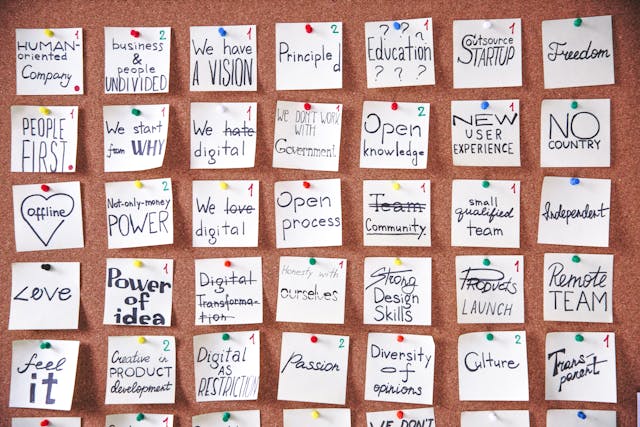Office Superpowers – What’s Yours?
If your office had superheroes, who would you be? We all have unique personal strengths, which, when recognised, can be powerful ‘superpowers’ that can fast-track your career success. Whether you’re a master strategist, an innovator, or the go-to person for tech troubles, your super skills make a bigger impact than you might realise in the workplace. When you can identify your personal strengths — and those of your work colleagues — you boost your ability to collaborate, innovate, and thrive in your role. So, what’s your office superpower?
1. The Strategist
If you’re a strategist, you’ll find problem-solving and big-picture thinking comes naturally to you. You may even notice this power seep into your personal life, where you’re relied upon to plan family holidays, budgets, and social events with surgical precision. If you’re a strategist, you’re lucky. It’s a superpower that’s valuable across many careers and industries and likely to lead to leadership roles.
Personal Strengths
- Critical thinking
- problem-solving
- Big-picture planning
Superpower – Strategy X-Ray Vision
Your superpower is having an x-ray vision for strategy, which allows you to see through challenges and find solutions quickly.
Success Tip
We encourage you to take advantage of structured brainstorming sessions, which are particularly helpful in professional settings, enabling teams to solve complex problems, innovate, or make strategic decisions. Your superpowers will shine in these meetings. If you haven’t already, explore our range of professional development courses in Leadership and management.
2. The Communicator
Are you The Communicator? If this is your superpower, you’re a powerful communicator, excelling at persuasive speaking and building rapport with colleagues and superiors.
Personal Strengths
- Excellent speaker
- Persuasive
- Excel at building relationships and rapport
Superpower – Sonic Influence
Your ability to turn words into powerful tools is a superpower that some might call the ‘gift of the gab,’ but it enables you to make valuable connections and influence others in both your professional and personal life. Deduce
Success Tip
You shine in presentations, so take advantage of this superpower by volunteering to lead meetings, pitches, or client proposals. You’re also likely a skilled negotiator, so we’re confident that you’ll have no trouble resolving conflicts, closing deals, or influencing stakeholders. Or why not put your hand up as the leader in team-building exercises? You’ll soon see progress in your career, and we can tell it’s a one-way ticket to success.

3. The Organiser
Your detail-oriented nature means you thrive on structure and would make a phenomenal project manager! If this sounds familiar, your superpower is most likely The Organiser!
Personal Strengths
- Detail-oriented
- Thrive on structure
- Expert in project management
- Time management
Superpower – Time manipulation
Your time manipulation powers ensure everything in your personal and professional life runs like clockwork. Your time-management skills are second to none, so don’t underestimate the superpower of time manipulation! If you’re not a project or practice manager, it may be time to reevaluate your career path.
Success Tip
You should consider taking the lead on project timelines, organising team schedules, or streamlining processes to boost efficiency. You’ll quickly become irreplaceable as the go-to person for keeping important projects on track and ensuring deadlines are delivered with ease.
4. The Innovator
Your creativity knows no bounds, allowing your true potential to shine in a creative field. As an innovator, you generate ideas and transform the ordinary into the extraordinary. If you often find yourself daydreaming about new ways to accomplish tasks, you are definitely an innovator.
Personal Strengths
- Creative thinking
- Thrive on new ideas and solutions
Superpower: Idea Generation
You possess an incredible talent for approaching and tackling challenges differently. As an innovator, you have a unique ability to discover fresh perspectives and creative solutions that inspire those around you.
Success Tip
This superpower is a game-changer when it comes to boosting your career prospects. It’s especially powerful in roles that demand creativity, innovation and problem-solving. If you can lead brainstorming sessions and challenge the status quo at work, you’ll be a rising star! But if you want to maximise your superpower, pair your strong creativity with
5. The Empath
Do you possess high emotional intelligence? If people are drawn to you to share their problems, there’s a strong possibility that you are The Empath of superheroes.
Personal Strengths
- High emotional intelligence
- Supportive nature
- Strong conflict resolution skills
Superpower – Emotional Radar
As an empath, you possess an exceptional emotional radar and the unique ability to respond to your colleagues’ emotions and needs. As a result, you build strong connections and trust, encouraging open communication and collaboration. You also have a natural disposition toward empathy, which helps you mediate conflicts with sensitivity.
Success Tip
Your compassionate nature makes you an ideal candidate to manage workplace well-being initiatives. As The Empath, you are more likely to advocate for a positive work environment that prioritises mental health and emotional support, contributing to a more engaged and productive workplace. If you’d like to initiate wellbeing programs in your workplace, discover our professional development course, Workplace Wellbeing Program.
6. The Tech Wizard
Are you a tech-savvy digital problem-solver? If your personal strengths include effortlessly fixing tech issues by simply walking past a computer, you may be The Tech Wizard. Jokes aside, some people have a knack for technology, which comes with many amazing personal strengths.
Personal Strengths
- Tech-savvy
- Fast learner
- Strong problem-solver in digital spaces
Superpower – Cybernetic Connection
The power of cybernetic connection means you can turn digital chaos into organised systems in the workplace. It’s a true superpower that boosts productivity, streamlines workflows, and ensures every file, tool, and process is exactly where it needs to be, which saves your team time and stress.
Success Tip
If you haven’t already, consider volunteering to lead technology initiatives within your organisation that address common problems. When you develop tech initiatives and troubleshoot IT problems, you will significantly boost your career success and establish yourself as a valuable asset.
7. The Motivator
If you’re the motivator, you’re likely to thrive in fast-paced environments and inspire others to achieve more. Motivators are high-energy individuals who are always on the go as if powered by a V8 engine. Does this sound like you? If so, you’re most likely The Motivator superhero.
Personal Strengths
- Inspires others
- Thrive in fast-paced environments
- High energy
- Passionate
- Driven
Superpower: Energy Surge
You have more energy than a lightning bolt in a power surge, and when harnessed right, you can boost team morale during tough times. Your positivity and drive are contagious, so you have the gift of lifting spirits and keeping everyone motivated even through the most challenging times.
Success Tip
Your personal strengths are energy and passion, making you ideal for leadership roles where you’ll shine, particularly during high-pressure moments. If you’re interested in exploring leadership and management opportunities, consider our range of professional development courses in this area.
We challenge you to channel your office superpower for personal and professional development. If you possess multiple personal strengths, great job! If you’re strong in some areas but lacking in others, consider teaming up with colleagues with complementary personal strengths and watch your performance soar.
Can we help you channel your superpower? To explore your options, simply contact one of our Course Consultants today at 1300 76 2221 or via Live Chat.












